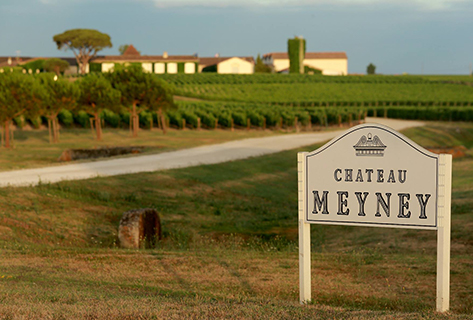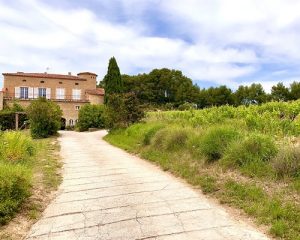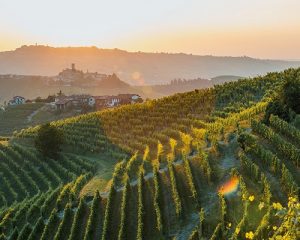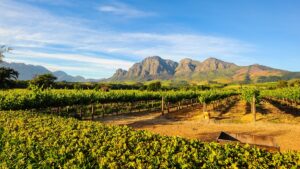
Château Meyney is ‘an iron hand in a velvet glove’ according to David Launay, commercial director of this Saint-Estèphe estate. And this is a property that has seen some history; for over three centuries, the grapes grown here have been crafted into wines that leave an impression whilst remaining delicate.
Deep-rooted history
Bottles from Château Meyney have 1662 inscribed onto them, the year when Cistercian monks, the Pères Feuillant, finished rebuilding their monastery. In reality, however, the estate’s vineyards were planted even earlier than this, in 1625. Initially cultivated alongside many different species of plant (polyculture), the vines have always thrived in this exceptional terroir. And it was following the French Revolution that the estate reached its current size, covering 51 hectares of vine land.
Enjoying a rare location for the region’s vineyards, Château Meyney faces onto the Gironde river, featuring a breath taking view that likely hasn’t changed much since the domain’s creation. The soil is rich in clay and gravel, a vein of blue clay slicing through it, conferring a creamy palate reminiscent of Pomerol cuvées.
One particularity of Meyney is its choice of grapes and the proportion of each one. 55% of the vines are Cabernet Franc, 30% are Merlot, and 15% Petit Verdot. It’s this latter variety that marks the DNA of the domain, distinguishing it from others in the area. The Petit Verdot vines are mature, having been first planted in the 1950s, and they grow in the vineyard’s lower ground, a veritable mosaic of soils that give the vines a remarkable character.
For all of these reasons, the estate was classed as a ‘cru bourgeois’ as soon as such a classification existed, a way of solidifying its reputation. However, Meyney took the decision to leave the label behind in 2008 due to the restrictions it entailed. They wanted more freedom to pursue their own path.
A move to organics
For around twenty years now, the domain has tasked itself with a more eco-friendly focus that centres the earth in which they grow their vines and the wellbeing of the people who work there. Meyney can boast of being one of the first advocates of sexual confusion in the vineyards (a pheromone-based method that prevents certain destructive insects from reproducing); this is an alternative to using insecticide chemicals on the vines themselves. This year marks the first of their totally organic vintages. Official certification is the next goal, a milestone they hope to achieve by 2024 as part of the château’s pivot towards biodiverse production and energy-saving methods.
There are 17 permanent members of staff at Château Meyney, including cellar master Thomas Hernandez and production manager Fabien Faget, both of whom are responsible for the meticulous process of the domain’s wine making.
Since the grapes are harvested by hand, the team is reinforced by a good sixty extra workers in the autumn. Once picked, the fruit is sorted twice, once in the vineyards and then in the winery, where an optical separation machine is used to choose the very best grapes. Maceration lasts between two and three weeks, and the juice is tasted daily. Since the grapes offer ‘incredible generosity in terms of colour and tannin’, this tasting process allows extraction and balance to be carried out to perfection.
Anne le Naour, Château Meyney’s current managing director, has brought ‘a new and different perspective on the making of our wine, especially when it comes to harvest dates. Precise and meticulous, she shares all of her experience for the good of Meyney’, David explains.
The wines
Château Meyney’s cuvées are known for their bright colour in the glass. Fresh and balanced, they carry an incredible aromatic palette full of spices and white pepper.
The personality of each and every vintage can be nicely distinguished. The 2008 isn’t unlike a Pomerol wine, offering truffle-based notes and expressing the blue clay of its terroir. The 2009 and 2010 vintages are a bit more powerful, a perfect reflection of the sun-kissed years in which they were created. According to David Launay, you could keep these cuvées in your cellar for a hundred years! 2012 leans more on the fruity and flavourful side with a nice balance. And the 2011, celebrating a decade since its creation, is a wine that’s ready to uncork, and you should leave it to aerate for a few hours before enjoying.
Meyney’s second wine represents a third of its production. It is made using the domain’s more recently planted vines, though it undergoes the same vinification steps as the château’s other cuvées. This wine spends many long weeks ageing in oak barrels, 10-15% of which are new.
The future
In terms of future projects, Château Meyney is dedicated to its social and environmental aims, whilst also developing its capacity to welcome visitors. Viti-pasteurisation, biodiversity, and polyculture all feature in the estate’s mission statement…a conviction that rounds things off rather nicely for them, since these methods were all part of Meyney’s philosophy when it was first founded! An ambitious project considering the commercial pressures faced by today’s team, but one that they stand by with great passion!



